I’m playing around with this as a way to link to items I’ve read and have little to add to, but that don’t overlap with the Off the Radar turf. – Investment banks (read: Goldman Sachs) have been making money coming and going on Greece’s debt. Jean Quatremer has been covering this for a few weeks, but delicately because few people are willing to go on record. The target, according to Quatremer, is not Greece, but the euro. Lots of Soros wannabe’s out there. – If uranium is the new oil, Kazakhstan is the new Persian Gulf, complete with all […]
South Asia Archive
Free Newsletter
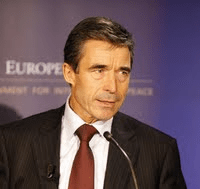
NATO Secretary-General Anders Fogh Rasmussen is playing a crucial role in sustaining the alliance’s Afghan mission, encouraging allied governments and publics alike during his transatlantic travels to appreciate the perspectives of their partners as well as the value of NATO as an institution. Consistent with that, among the objectives of his trip to Washington this week was to remind Americans of how extensively other NATO countries have collaborated in support of U.S. security objectives. In addition to meeting with media and U.S. officials, Rasmussen was also in Washington to participate in a seminar held to advise the Group of Experts […]
Afghan officials are continuing to raise concerns over a recent wave of civilian casualties. Chairman of the US Joint Chiefs of Staff Admiral Mike Mullen attributes these errors to be in great part due to difficult terrain and an enemy that is known to mingle with civilians making differentiation difficult. At the end of the day, Mullen said, “war is ugly.”
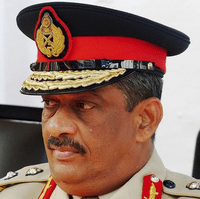
The recent election loss of Sri Lankan opposition candidate Gen. Sarath Fonseka underlines the island’s failure to build on its recently achieved peace, while his subsequent detention brought to light a threat to its democracy. Now, upcoming parliamentary elections, slated for April 8, represent the country’s last chance to build an opposition that can bring the ethnic grievances that drove Sri Lanka’s civil war into the political arena, while also maintaining a stable multiparty democracy. Incumbent President Mahinda Rajapaksa wasted little time in using his commanding electoral victory over Fonseka to consolidate his power. Shortly after the election, Fonseka was […]
As NATO forces move deeper into their Marjah offensive, WorldFocus speaks with Marvin Weinbaum of the Middle East Institute about what this new strategy might mean for the the future of Afghanistan. He said, “I have no doubt that we will be able to clear the area,” in reference to Marjah. His uncertainty is with handing over security detail to Afghan forces.
As the Marjah offensive progresses, the alleged capture of resistance leader Mullah Abdul Ghani Baradar in Pakistan has raised questions about the structure of the Taliban and how it would recover from a significant loss of leadership. Judy Woodruff speaks with Afghanistan political experts Seth Jones, Thomas Johnson and Steve Coll. “The key issue will be negotiating with the key power brokers in the Marjah area,” Jones says.
Normally I’d have bookmarked this kind of item for an “Off the Radar” post. But for a variety of what seem like obvious, if intuitive and somewhat intangible reasons, I’m elevating major telecom transactions to “On the Radar” status, alongside weapons sales, nuclear agreements, gas and oil deals and the like. In this case, that’s partly because it’s an Indian telecom company, Bharti Airtel, buying Kuwait-based Zain’s African operations, to the tune of a $10.7 billion purchase price. (The deal has yet to be finalized, pending due diligence.) This is significant for a few reasons. First, as Thomas P.M. Barnett […]
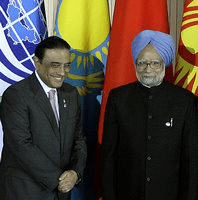
NEW DELHI — After a freeze on bilateral dialogue of more than a year, New Delhi’s proposed talks with Islamabad at the foreign secretary level, now scheduled for Feb. 25, have invited diverse reactions. India’s previous refusal to engage with its neighbor in the aftermath of the Mumbai terror attack of Nov. 26, 2008, was meant to pressure Islamabad to both prosecute the perpetrators of the Mumbai carnage and offer unambiguous commitments to crack down on terrorism. The scars from the Mumbai attack, which left 170 people dead, have not yet healed. Nor has Pakistan done anything substantive to assuage […]
I’ve held off on any Marja “analysis,” because a lot of what I’ve read has struck me as “play-by-play” commentary, and I’m pretty convinced that whatever impact offshore observers can have on the debate is better directed toward strategic objectives than tactical operations. What does strike me as significant about the offensive, though, is what it reveals in terms of the evolution of U.S. COIN operations. It’s been clear for a while that in the “clear, hold and build” model, the U.S. military has no real problem with the “clear” phase, provided it is adequately resourced. The decisive phases in […]
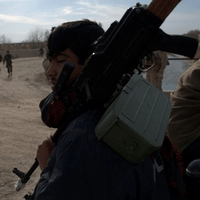
Balint Szlanko has been embedded with the 2nd battalion, 2nd Marine regiment and the 3rd battalion, 4th Marine regiment in Garmsir and Now Zad districts, Helmand province, Afghanistan, in January. His WPR briefings can be found here and here. Following a surge of American troops last year, both areas have recently been cleared of Taliban insurgents. With the onset of winter, fighting has for the moment given way to patrolling and busily interacting with the locals. Cpt. Jason Brezler of Lima company, 3rd battalion, 4th Marine regiment, and an Afghan elder share a moment in the sun in the town […]
With both Indian and Pakistani media sources reporting — and largely supporting — renewed hope for the re-engagement of formal talks between the two nations, panelists at a recent Asia Society talk, “India and Pakistan: Back from the Brink?” agreed that a unique window of opportunity to rev up the historically stalled negotiations now exists — and must be seized. Dr. Adil Najam told event attendees that the time is now ripe, but that relations could soon sour if not taken advantage of. Najam, a professor in international relations at Boston University, said the key to successful, substantive talks will […]
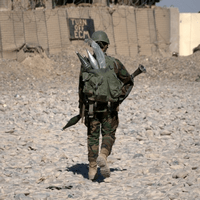
HELMAND PROVINCE, Afghanistan — For Gen. Nick Carter, commander of NATO forces in southern Afghanistan, and Gen. Larry Nicholson, commander of the U.S. Marines in Helmand, taking a walk late last month in the Garmsir district center’s bazaar without a flak jacket was no big deal. The northern bit of the district, known as the Snake’s Head, has been relatively stable for about a year — unusual for the troubled province of Helmand, which is home to a massive insurgency that makes it a dangerous place to visit even in heavily armored vehicles. But perhaps the most noteworthy thing about […]
Ashraf Ghani, Chairman and Co-Founder of the Institute for State Effectiveness, explains his view on the pillars of insurgency in Afghanistan at the World Economic Forum in Davos. Ghani says that bad governance, a wealthy, drug-funded base, Al-Qaida, and havens in Pakistan are the driving causes leading insurgencies.
I don’t want to make too much of Pakistan’s offer to facilitate negotiations with the Taliban, because there are still a lot of directions it can take, and many of them are probably bad. But it bears noting that the shift responds to Islamabad’s concerns over securing its influence in a post-American Afghanistan, and was triggered by the July 2011 timeframe that President Barack Obama set for beginning an American drawdown. That suggests two things. First, the regional actors are taking that timeframe a lot more seriously than most American observers, something that was already apparent in the immediate reaction […]
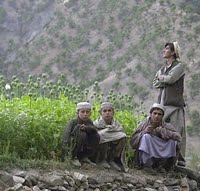
Over the past 30 years, the poisonous effects of Afghanistan’s narcotics industry have steadily transformed Iran’s law enforcement and border security institutions, forcing drastic changes in the way Iran deals with what has become a burgeoning transnational narco-insurgency on its southeastern frontier with Pakistan and Afghanistan. Iran’s police chief, Brig. Gen. Ismail Ahmadi Moqaddam, announced last October that Iranian authorities are now using remote security surveillance and control systems from Tehran to help monitor and interdict the massive flow of narcotics streaming over the border from Afghanistan. But despite the country’s draconian anti-narcotics laws and aggressive interdiction efforts, Iran remains […]
The NY Times has two interesting articles on a subject I’ve written about before: film and literature inspired by the Iraq and Afghanistan War. Like me, they note the lack of novels, as compared to memoirs, although this is to be expected given the lag-time before good fiction usually appears. Interestingly, they also discuss something that I’d ignored, namely the lack of political criticism in both the literature and cinema that has come out of the wars to date. In some ways, that was implied in my previous remarks, given the nature of the great post-War and Vietnam-era film and […]
Three Americans were killed as the result of a roadside bomb inPakistan, near the Afghan border. The deaths were the first of theirkind since the U.S. military’s involvement in training activities inPakistan’s tribal regions. Though the Taliban has claimedresponsibility for the attacks, it is unclear whether the U.S.personnel were the targets of the attack or were just a byproduct of anattack meant to deter attendance at an inauguration for a regionalall-girls school. NewsHour’s Gwen Iffil speaks with Dawn TV’s SaimaMohsin.
